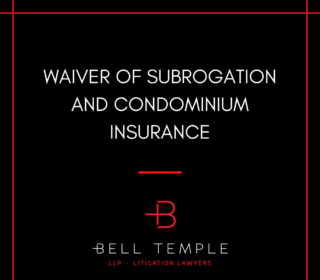On July 7, 2023, the Ontario Court of Appeal released its judgment in Ahluwalia v. Ahluwalia. The following case commentary of Ahluwalia focuses on the court’s analysis regarding punitive damages. Trial judges must assess whether punitive damages are warranted before making such awards. Punitive damages are the exception rather than the rule, and they should only be awarded in appropriate circumstances.
Background and Factual Overview
The parties to the litigation were married in 1999 and separated in 2016. They had two children. The trial judge found that Mr. Ahluwalia had been abusive during the marriage, which was characterized by a pattern of emotional and physical abuse and financial control. Ms. Ahluwalia brought an action for statutory relief – divorce, child support, spousal support, and property equalization – and she also claimed damages for her husband’s conduct during their marriage. The trial judge recognized a new tort of “family violence” and awarded Ms. Ahluwalia $150,000 in damages – $50,000 for each of compensatory, aggravated, and punitive damages. The trial judge then considered the statutory claims, finding that Mr. Ahluwalia owed payment to Ms. Ahluwalia. After accounting for the retroactive support awards, property equalization, post-separation adjustments, and damages award, the trial judge determined that Ms. Ahluwalia was entitled to the entire proceeds of the sale from the matrimonial home, which was essentially all that the couple had.
On appeal, Mr. Ahluwalia conceded that he was liable in damages although he disputed the amount awarded. With respect to punitive damages, he submitted that the trial judge did not properly address aggravated and punitive damages. Although his wife had made a summary reference to “general, exemplary and punitive damages”, no relief was sought for aggravated damages, and no basis for punitive damages was set out. He argued that the disproportionality of the trial judge’s damage award was underlined by the fact that Ms. Ahluwalia only sought damages of $100,000, and that the trial judge awarded 50% more than was requested. In response, Ms. Ahluwalia submitted that the trial judge’s determination should be afforded deference, and that there was a basis to award aggravated and punitive damages. She submitted that the aggravated damages for betrayal of trust, breach of fiduciary duty, and relevant post-incident conduct, as well as punitive damages based on the social harm associated with family violence, were justified.
The Ontario Court of Appeal’s analysis regarding punitive damages
The court found that the trial judge had erred in creating the new tort of “family violence”. However, it also found that the trial judge’s findings of fact satisfied the requirements for the existing torts of battery, assault, and intentional infliction of emotional distress. Moreover, the court noted that prior decisions had long recognized that patterns of physical and emotional abuse constitute tortious behaviour.
The court deferred to the trial judge’s assessments for compensatory and aggravated damages but did not agree with the trial judge’s punitive damages award. The court agreed with the trial judge that Mr. Ahluwalia’s conduct called for condemnation but found that the trial judge had failed to take a required step in the analysis of whether an award of punitive damages was warranted. The court found that the trial judge erred because she did not address or make any finding that the award of general and aggravated damages was insufficient to achieve the goals of denunciation and deterrence.
The court referred to the Supreme Court of Canada’s groundbreaking case in Whiten v. Pilot Insurance, 2002 SCC 18, [2002] 1 S.C.R. 595, which set out the principles for an award of punitive damages, as follows:
- Punitive damages are very much the exception rather than the rule.
- They are imposed only if there has been high-handed, malicious, arbitrary or highly reprehensible misconduct that departs to a marked degree from the ordinary standards of decent behaviour.
- Where they are awarded, punitive damages should be assessed in an amount reasonably proportionate to such factors as the harm caused, the degree of misconduct, the relative vulnerability of the plaintiff and any advantage or profit gained by the defendant.
- Such awards should have regard to any other fines or penalties suffered by the defendant for the misconduct in question.
- Punitive damages are generally given only where the misconduct would otherwise be unpunished or where other penalties are or are likely to be inadequate to achieve the objectives of retribution, deterrence and denunciation.
- The purpose of punitive damages is not to compensate the plaintiff.
- The purpose of punitive damages is to give a defendant his or her just deserts (retribution), to deter the defendant and others from similar misconduct in the future (deterrence), and to mark the community’s collective condemnation (denunciation) of what has happened.
- Punitive damages are awarded only when compensatory damages, which to some extent are punitive, are insufficient to accomplish these objectives.
- Punitive damages are awarded in an amount that is no greater than necessary to rationally accomplish their purpose.
- While normally the state would be the recipient of any fine or penalty for misconduct, the plaintiff will keep punitive damages as a “windfall” in addition to compensatory damages.
- Judges and juries in our system have usually found that moderate awards of punitive damages, which inevitably carry a stigma in the broader community, are generally sufficient.
The court in Ahluwalia concluded that a proper consideration of the Whiten requirements did not justify an award of punitive damages because the compensatory and aggravated damages (in the amount sought by Ms. Ahluwalia) were sufficient to accomplish the objectives of condemnation. The court found that it was unreasonable and disproportionate for the trial judge to add punitive damages in the amount of an additional 50% of the total claimed, without any explanation. Accordingly, the court allowed the appeal with respect to the punitive damages award, thereby reducing the total damages to $100,000. The court clarified that its judgment was not to say that where a tort was made out in circumstances such as these, that punitive damages are never justified – they may very well be, where the trial judge is satisfied that the deterrent and denunciatory effects of the other heads of damages are insufficient to accomplish the objective of condemnation.
Commentary
A key takeaway from the Ahluwalia decision is that punitive damages must be warranted. Punitive damages are not typically awarded in the ordinary course, and such awards are the exception rather than the rule. Reprehensible conduct on its own, where the other Whiten requirements have not been satisfied, will not be sufficient to justify a punitive damages award. As a best practice, a litigant should always carefully assess the relevant factors of his or her case before seeking an award for punitive damages.







